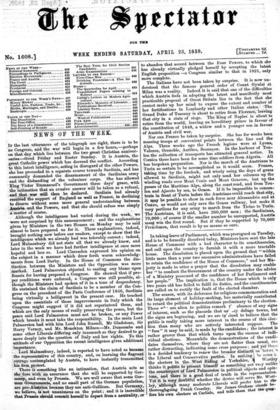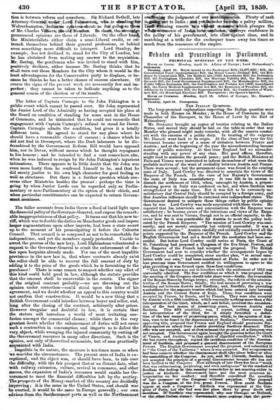In taking leave of Parliament, which was prorogued on Tuesday,
and is to be formally dissolved today, Ministers have sent the late House of Commons with a bad character to its constituencies, and call upon the country to furnish it with a more tractable house. The dissolution is placed upon the ground that " within little more than a year two successive administrations have failed to retain the confidence of the House of Commons," and her Ma- jesty is made to utter a prayer that the dissolution may enable her " to conduct the Government of the country under the advice of a Ministry possessed of the confidence of her Parliament and her people." The implication is, that the House which is only two years old has failed to fulfil its duties, and the constituencies are called on to rectify the fault of the elected chamber.
The season, with its deference for religious commemoration and its large element of holiday-making, has materially contributed to retard the political demonstrations preliminary to the election. Those e-1-- are alien to politics remark t' absence of any signs
of interest, such as the placards that deluge towns, but the signs are beginning, and we are tined to believe that the
public is really taking more interest in the course of this elec- tion than many who are actively interested suppose. The " fuss " it may be said, is made by the candidates ; the interest is rather graver than that which turns upon the success of indi- vidual elections. Meanwhile the demonstrations of the candi- dates themselves, where they are not flatter than usual, are rather distracting, indicating some cross purposes ; and yet that.: is a decided tendency to renew the broader distinc es betwa
the Liberal and Conservative parties. In seeiJng he votes o the electors in the West Riding of Yorkshire, Wortley
thinks it politic to present himself as something not vel y unlike the counterpart of Lord Palmerston in political objects and opin- ions, 9,nd there is a good deal of truth in the representation. Yet it is very doubtful whether the device will serve Mr. Wort- ley, although many moderate Liberals will prefer him to the thoroughgoing Frank Crossley. Sir James Graham stands be- fore his own electors at Carlisle, and tells them that the qua.- tion is between reform and nareform. Sir Richard Bethel], late Attorney-Generat under Lerch Palmerston, who is standing for Wolverhampton, indicates opinions about as fan going as those of Mr. Charles Valiern the old' Menthes fis shore, the:strongly- pronounced opinions are those of Liberals. Ott the other hand, the Ministerialists either claim a semi-Liberal credit, or en- trench themselves behind their general professions, or behind even something more difficult to interpret. Lord Stanlen.-fer example, has not declined to stand for the City of London, but he has abstained from making any answer to the- inquisition.. Ir. Baring, the gentleman who was invited to stand with him, positively declines, either because Mr- Baring thinks that he shall' turn out those Members for the City whom it would be the least advantageous for the Conservative party to displace, or be- cense he thinks he has abetter chance of success elsewhere. Of course the signs of the present week are necessarily few and im- perfect; they cannot be taken to indicate anything as to the general coarse of the election or of its results.



























 Previous page
Previous page